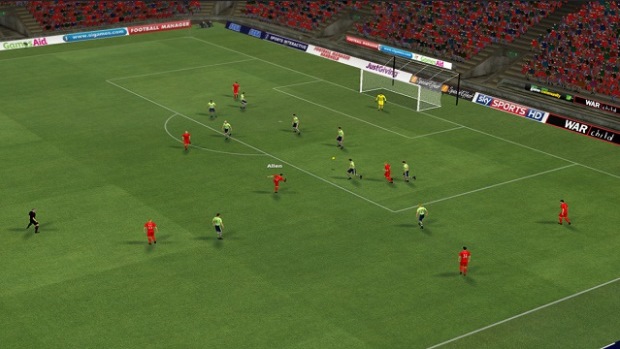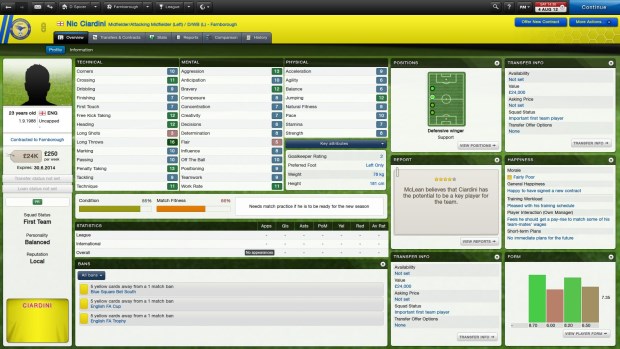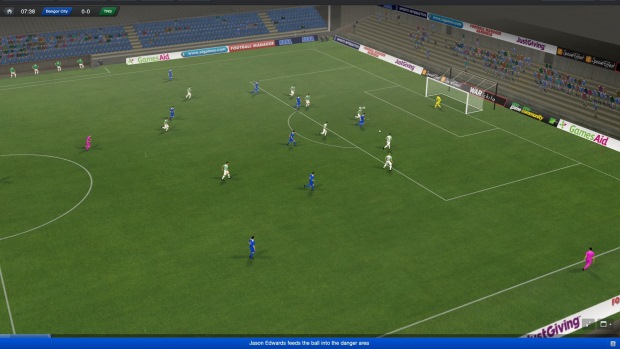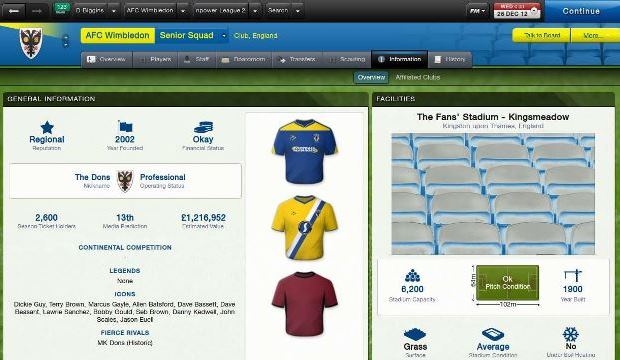At this point it would take a monumental conscious effort on the part of Sports Interactive to make a bad Football Manager. In the years since the developer signed with SEGA and Football Manager was born, the core game has been steadily refined to sub-genre perfection. So it should come as no surprise then that Football Manager 2014 is very, very good.
Management sims are simultaneously an acquired taste and an incredibly popular one. It’s a text adventure about making the most of an enormous database of stats. You don’t score goals yourself, there’s no end game and a player’s look is based on just skin-tone and hair colour – no uncanny valley here.

Selling the concept to anyone who has never played such a game is tough, but given sufficient time playing it, and not to mention the requisite passion for football, they’ll find themselves as addicted as the rest of us.
The beauty of the series is in the fantasy of taking your team to cup glory, taking a lower league side to the top of the Premiership or, best of all, both. None of us actually wear a suit and tie when we reach a cup final, but a small part of us wants to – because while those matches may not play differently or require any additional input, they are at the same time absolutely different and feel like a special occasion.
A year’s development is often just enough for a sports series to update its player database and give the previous year’s game a bit of a polish. Football Manager, however, has no need to spend as much time on the cosmetic side of things, making a year the perfect amount of time to continue honing a near-perfect system.

Changes to Football Manager 2014 include overhauls to the scouting and training systems as well as an update to the ability to give instructions on the fly during a game. Introduced last year, now the options are displayed in a table with the selection of one shout showing which others it clashes with and are no longer available. Tell your team to play at a higher tempo, for example, and they won’t be able to take a breather.
Most of the changes are perfectly logical like this; for example, pre and post-match press conferences are now held within the message telling you to attend, which only removed the need for one additional click but immediately strikes players as a welcome change.
With each change the series edges closer to “realism” than any other sports title on the market. This year’s game has few major changes but a large number of smaller ones. Perhaps the biggest change is the ability to set up plans for certain scenarios that may occur in any given match. If you’re down 1-0 at half time for example you can set up a plan that will be automatically executed should that happen.

You can now loan a player back to the club you’ve bought them from, which is an excellent bargaining chip and a particularly great addition if you’re the manager with bigger clubs clambering for your young star’s signature. When attempting to sign a player, negotiations with a club are now able to take place on a single screen rather than both parties lobbing offers at each other and waiting an in-game day for a response. Your assistant manager’s advice will also now show up on screen during a match with a single button to apply said advice immediately, or take you to the appropriate screen if more input is required.
The abundance of features makes the game a daunting prospect at first and for new players it’s hard to initially get to grips with. This is easy to chalk up as a representation of the intricacies of real life management, but some relish the challenge and welcome playing the long game. For players with less time on their hands, the brilliant Football Manager Classic mode returns. Introduced last year, the streamlined mode allows players to progress quicker by removing a lot of the fine-tuning that goes on in the main game and automating in certain areas.
FMC harks back to the simplistic days of classic Championship Manager. Of course “simplistic” is a relative concept here; after all, it’s still a simulation. This year introduces the ability to increase the size of FMC’s database and lift the restriction on the number of countries you can manage in, bringing it closer to the main game. This year, there is also the ability to have cross-save between the PS Vita and PC versions, surely making it the handheld Football Manager of choice.

Football Manager 2014, as a simulation, is as good as it has ever been and likely ever will be. The key to the future of the series is to improve it as a game, and sufficient improvement in this area is tough when there’s no competition. For some, a more complicated simulation is the game, and conquering it provides their entertainment. For others it’s too fixated on details and moves at too slow a pace to be fun, and for those people there is Classic Mode.
VERDICT: The best possible Football Manager game lays between the two modes, and in the years to come the gap will close between them. Sports Interactive will also face increasing pressure to add the ability to cross-save between all versions of the game, and package some versions together – a free mobile download with the PC game, for instance.
Another thing SI will have to be wary of is complacency. Football Manager has no real direct competition, and that can only cause problems in the long run. For now, however, Football Manager remains a top game and the best of its kind. It suits all comers, and is the most complete management sim yet.

SUPERB. This is the mark of greatness, only awarded to games that engage us from start to finish. Titles that score 9/10 will have very few problems or negative issues, and will deliver high quality and value for money across all aspects of their design.





